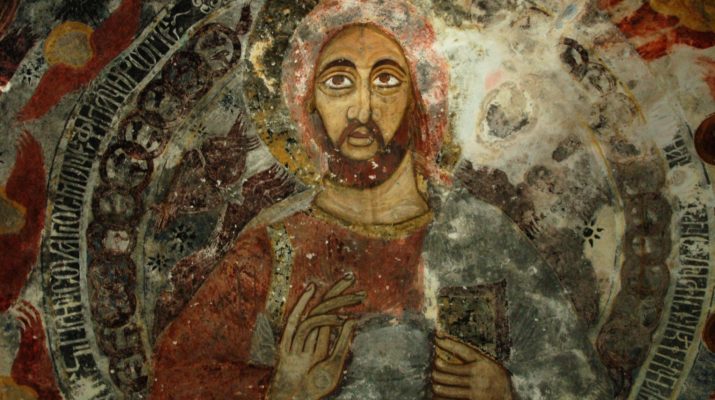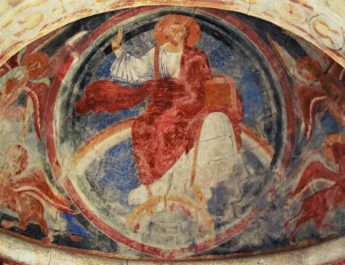John 14:1-14
Fifth Sunday of Easter A
BibleHub
1 “Do not let your heartsI be troubled.II BelieveIII in God;IV believe also in me.
Notes on verse 1
I “hearts” = kardia. Literally the heart, but figuratively mind, character, inner self, will, intention, thoughts, feelings. Also, the center of something. The word heart is only used figuratively in the Old and New Testaments. This is where “cardiac” comes from.
II “troubled” = tarasso. 18x in NT. This is trouble, agitate, stir up. It is motion back and forth, creating inner turmoil or confusion, roiling water.
III “believe” = pisteuo. From pistis (faith, faithfulness, belief, trust, confidence; to be persuaded or come to trust); from peitho (to have confidence, urge, be persuaded, agree, assure, believe, have confidence, trust). This is to believe, entrust, have faith it, affirm, have confidence in. This is less to do with a series of beliefs or doctrines that one believes and more to do with faithfulness, loyalty, and fidelity. It is trusting and then acting based on that trust.
IV “God” = Theos. From Proto-Indo-European origins, meaning do, put, place. This is God or a god in general.
2 In my Father’sV houseVI there are manyVII dwelling places.VIII
Notes on verse 2a
V “Father’s” = Pater. This is father in a literal or figurative sense. Could be elder, senior, ancestor, originator, or patriarch.
VI “house” = oikia. From oikos (house – the building, the household, the family, descendants; the temple). This is a house, household, goods, property, family, or means.
VII “many” = polus. This is much, often, plenteous – a large number or a great extent.
VIII “dwelling places” = mone. 2x in NT. From meno (to stay, remain, wait, await, continue, abide, endure; to literally stay in a place or to remain in a condition; to continue with hope and expectation). This is an abode, lodging, or residence. It is the act of abiding or the place in which one abides.
If it were not so, would I have told you that I goIX to prepareX a placeXI for you?
Notes on verse 2b
IX “go” = poreuomai. From poros (ford, passageway). This is to go, travel, journey, or die. It refers to transporting things from one place to another and focuses on the personal significance of the destination.
X “prepare” = hetoimazo. From hetoimos (make ready, be ready because of being prepared, standing by, adjusted; ready to meet some opportunity or challenge). This is to prepare or provide.
XI “place” = topos. This is a place or region. It is a smaller space that can only hold a limited number of people whereas chora is a larger place. Figuratively it could be an opportunity.
3 And if I go and prepare a place for you, I will comeXII again and will takeXIII you to myself, so that where I am, there you may be also. 4 And you knowXIV the wayXV to the place where I am going.”XVI
Notes on verses 3-4
XII “come” = erchomai. This is to come or go.
XIII “take” = paralambano. From para (beside, by, in the presence of) + lambano (active acceptance/taking of what is available or what has been offered; emphasizes the choice and action of the individual). This is to receive, take, acknowledge, associate with. It can also mean to take on an office or to learn.
XIV “know” = eido. This is to know, consider perceive, appreciate, behold, or remember. It means seeing with one’s eyes, but also figuratively, it means perceiving – seeing that becomes understanding. So, by implication, this means knowing or being aware.
XV “way” = hodos. This is way, road, path, or journey. It can imply progress along a route.
XVI “going” = hupago. From hupo (by, under, under the authority of) + ago (lead, bring, guide, spend, drive, carry). This is to lead under so to depart, go away, or die. It is to lead away under the command of someone else, being given a mission or objective to carry out.
5 ThomasXVII saidXVIII to him, “Lord,XIX we do not know where you are going.XX How canXXI we know the way?”
Notes on verse 5
XVII “Thomas” = Thomas. 11x in NT. From Hebrew toam (twin). This is Thomas, meaning twin.
XVIII “said” = lego. This is to speak, say, name, call, command. It is generally to convey verbally.
XIX “Lord” = Kurios. From kuros (authority, supremacy). This is a respectful address meaning master or sir. It refers to one who has control or power greater than one’s own. So, it was also applied to God and Jesus as Master or Lord.
XX “going” = hupago. Same as “going” in v4. See note XVI above.
XXI “can” = dunamai. This is to be able, or something that is possible. It can also be empowered or being powerful. The Greek word for “miracle” (dunamis) comes from this root.
6 JesusXXII said to him, “I am the way and the truthXXIII and the life.XXIV No one comes to the Father except through me.
Notes on verse 6
XXII “Jesus” = Iesous. From Hebrew Yehoshua (Joshua, the Lord is salvation); {from YHVH (proper name of the God of Israel; the self-existent and eternal one); {from havah (to become) or from hayah (to come to pass, become, be)} + yasha (to deliver, defend, help, preserve, rescue; properly, to be open, wide or free, which implies being safe. So, in a causative sense, this is to free someone)}. This is Jesus or Joshua in Greek – the Lord saves or the Lord is salvation.
XXIII “truth” = aletheia. From alethes (true, unconcealed; true because it is in concert with fact and reality – attested; literally, what cannot be hidden; truth stands up to test and scrutiny and is undeniable, authentic). {from a (not, without) + lanthano (unnoticed, concealed)}. Truth is literally that which is not or cannot be concealed. This word covers more than the sense of true versus false. It spoke of truth as that which corresponds to reality – reality as opposed to illusion. Thus, it includes, sincerity, straightforwardness, and reality itself.
XXIV “life” = zoe. From zao (to live, be alive). This is life including the vitality of humans, plants, and animals – it is life physical and spiritual and life everlasting.
7 If you knowXXV me, you will knowXXVI my Father also. From now on you do knowXXVII him and have seenXXVIII him.”
Notes on verse 7
XXV “know” = ginosko. This is to know, recognize, realize, perceive, learn. It is knowledge gained through personal experience.
XXVI “know” = eido. Same as “know” in v4. See note XIV above.
XXVII “know” = ginosko. Same as “know” in v7. See note XXV above.
XXVIII “seen” = horao. To see, perceive, attend to, look upon, experience. Properly, to stare at and so implying clear discernment. This, by extension, would indicate attending to what was seen and learned. This is to see, often with a metaphorical sense. Can include inward spiritual seeing.
8 PhilipXXIX said to him, “Lord, showXXX us the Father, and we will be satisfied.”XXXI
9 Jesus said to him, “Have I been with you all this time,XXXII Philip, and you still do not knowXXXIII me? Whoever has seen me has seen the Father. How can you say, ‘Show us the Father’? 10 Do you not believe that I am in the Father and the Father is in me? The wordsXXXIV that I say to you I do not speak on my own,
Notes on verses 8-10a
XXIX “Philip” = Philippos. From philos (dear, beloved, a friend, an associate; friendship with personal affection, a trusted confidante; love from personal experience with another person) + hippos (horse). This is Philip, meaning one who loves horses or is fond of horses.
XXX “show” = deiknumi. This is to show in a literal or figurative sense so it can be to teach, bring, or point out.
XXXI “be satisfied” = arkeo. Literally, “it is enough for us.” Arkeo is 8x in NT. This is to be content or satisfied. It can also mean to ward off.
XXXII “time” = chronos. Time in the chronological sense, quantitative time or a duration of time.
XXXIII “know” = ginosko. Same as “know” in v7. See note XXV above.
XXXIV “words” = rhema. From rheo (to speak, command, make, say, speak of); from ereo (to all, say, speak of, tell; denotes ongoing speech). This is word, which implies a matter or thing spoken, a command, report, promise, thing, or business. Often used for narration, commands, or disputes.
but the Father who dwellsXXXV in me doesXXXVI his works.XXXVII 11 Believe me that I am in the Father and the Father is in me, but if you do not, then believe because of the works themselves. 12 Very truly,XXXVIII I tellXXXIX you, the one who believes in me will also do the works that I do
Notes on verses 10b-12a
XXXV “dwells” = meno. Related to “dwelling places” in v2. See note VIII above.
XXXVI “does” = poieo. This is to make, do, act, construct, abide, or cause.
XXXVII “works” = ergon. From ergo (to work, accomplish, do). This is work, task, deed, labor, effort.
XXXVIII “very truly” = amen + amen. From Hebrew amen (verily, truly, amen, truth, so be it, faithfulness); from aman (to believe, endure, fulfill, confirm, support, be faithful, put one’s trust in, be steadfast. Figuratively, this is to be firm, steadfast, or faithful, trusting, believing, being permanent, morally solid). This word is literally firmness, but figuratively fidelity, faithfulness, honesty, responsibility, trust, truth, steadfastness. Properly, it is to be sure, certain, or firm. This is a word of emphasis indicating that something crucial follows.
XXXIX “tell” = lego. Same as “said” in v5. See note XVIII above.
and, in fact, will do greaterXL works than these, because I am goingXLI to the Father. 13 I will do whatever you askXLII in my name,XLIII so that the Father may be glorifiedXLIV in the Son.XLV 14 If in my name you ask me for anything, I will do it.
Notes on verses 12b-14
XL “greater” = megas. This is big in a literal or figurative sense – great, large, exceeding, abundant, high, mighty, perfect, strong, etc.
XLI “going” = poreuomai. Same as “go” in v2. See note IX above.
XLII “ask” = aiteo. This is to ask, demand, beg, desire.
XLIII “name” = onoma. Related to “know” in v7. May be from ginosko (see note XXVII above). This is a name, authority, cause, character, fame, reputation. The name was thought to include something of the essence of the person so it was not thought to be separate from the person.
XLIV “be glorified” = doxazo. From doxa (glory, opinion, praise, honor, renown; particularly used as a quality of God or manifestation of God – splendor); from dokeo (to have an opinion, seem, appear, suppose; a personal judgment; to think); from dokos (opinion). This is to render or hold something as glorious, to glorify, honor, magnify, or celebrate. This is ascribing weight to something by recognizing its true value or essence.
XLV “Son” = Huios. This is son, descendant – a son whether natural born or adopted. It can be used figuratively for other forms of kinship.
Image credit: Jesus at the Sumela Monastery in Turkey. Photo by Vladimer Shioshvili, 2006.




